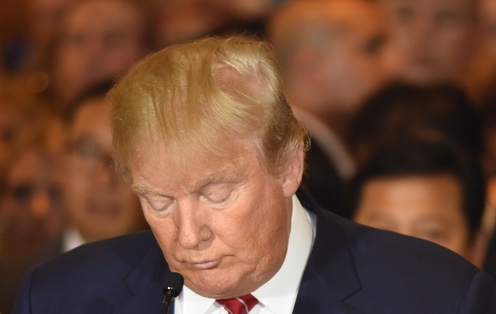The science of Donald Trump’s failure

Atheist Christopher Hitchens was once asked if proof of God’s existence were found would he reverse his position and become a believer. “Of course I would,” Hitchens instantly replied, “what a ridiculous question.” It is instructive to point out that Hitchens didn’t quibble about the meaning of the word “proof,” nor did he demand that his interlocutor give an example of what constituted proof in this particular case. He didn’t insist that proof for such a proposition was impossible to find because the evidence against was so overwhelming. He accepted the idea that proof, that is, evidence sufficient to convince, had been adduced in a relevant hypothetical. He asserted he would immediately reverse his position in light of such evidence. To suggest otherwise was “ridiculous.”
I’m not so naive as to to suggest Mr. Hitchens wasn’t ready for the question, nor am I going to suggest that he wasn’t perfectly aware that, sadly, the question was far from ridiculous. He was merely making a point (I believe) about how the ridiculousness of the question applied to himself in particular, and about how it applied to far too few people in general. His willingness to reverse himself so quickly ought to be instructive to us all. That it is not is largely down to the persistence of the ignorance of science.
Science at its best reverses itself immediately on any position when contradictory evidence comes to light. I say, “at its best,” because it seldom does. Remember, scientists are human beings too, and they hate being wrong just as much as you do. But any scientist worthy of the name will admit to this wrongness, sooner or later, because they know they must, because science demands it. It is an attitude we would all do well to adopt.
Those of you who know me know I am a staunch opponent of conspiracy theories. A conspiracy theory, as Wikipedia defines it, is any “explanation for an event or situation that invokes a conspiracy by sinister and powerful groups, often political in motivation, when other explanations are more probable.” These theories are often invoked without evidence. They include (but are not limited to) 9/11 Trutherism, the Moon Hoax theory, crop circles, birtherism, anti-vaxxerism, the two or three thousand different Kennedy assassination conspiracy theories, and so on.
I am prepared to reverse my position on any of those theories the hour, the minute, the second evidence sufficient to convince me otherwise should appear. Like Mr. Hitchens, I’m not going to quibble about the hypothetical, either. But you will never hear me say that I will stick to my position no matter what. That is not my position and it never has been.
That is the difference, finally, between science and religion, and that difference is now no longer theoretical nor academic but has become deadly in the distinction. As I write this roughly 100,000 Americans are dead because the president of the United States doesn’t understand that science matters and that science is better and more reliable than his self-proclaimed instinct. Moreover, had it been the case that the people who support him understood this, he would be unable to fool them and lie to them. In fact he wouldn’t try. Trump lies because he knows he can get away with it.
Rampant ignorance of science is why today the seeds of a million more American deaths are being planted in churches across America today. The president of the United States could have tried to persuade Americans to stay home, but he chose not to. He made this choice because he knew many of his followers would perceive his encouragement to reopen churches as a position of strength, even though he won’t go to church himself, even though he will probably play golf instead.
We must get rid of Trump in November, and we will. But the ignorance that made Trump possible will remain behind. The greatest lesson in this time of coronavirus is that science matters. Science saves lives. Science is where we must turn for answers. Science education needs to become a priority. Yes, science is sometimes wrong, but it is wrong in the same way we are sometimes wrong when we are driving home and we make a wrong turn. We get home because we realize we made a wrong turn and we go back and we fix it. Science is better than dogma every time, because dogma never finds its way home, and it never will. Science will and does find its way home, sooner or later. And, as ever, ladies and gentlemen, brothers and sisters, comrades and friends, stay safe.

Robert Harrington is an American expat living in Britain. He is a portrait painter.
